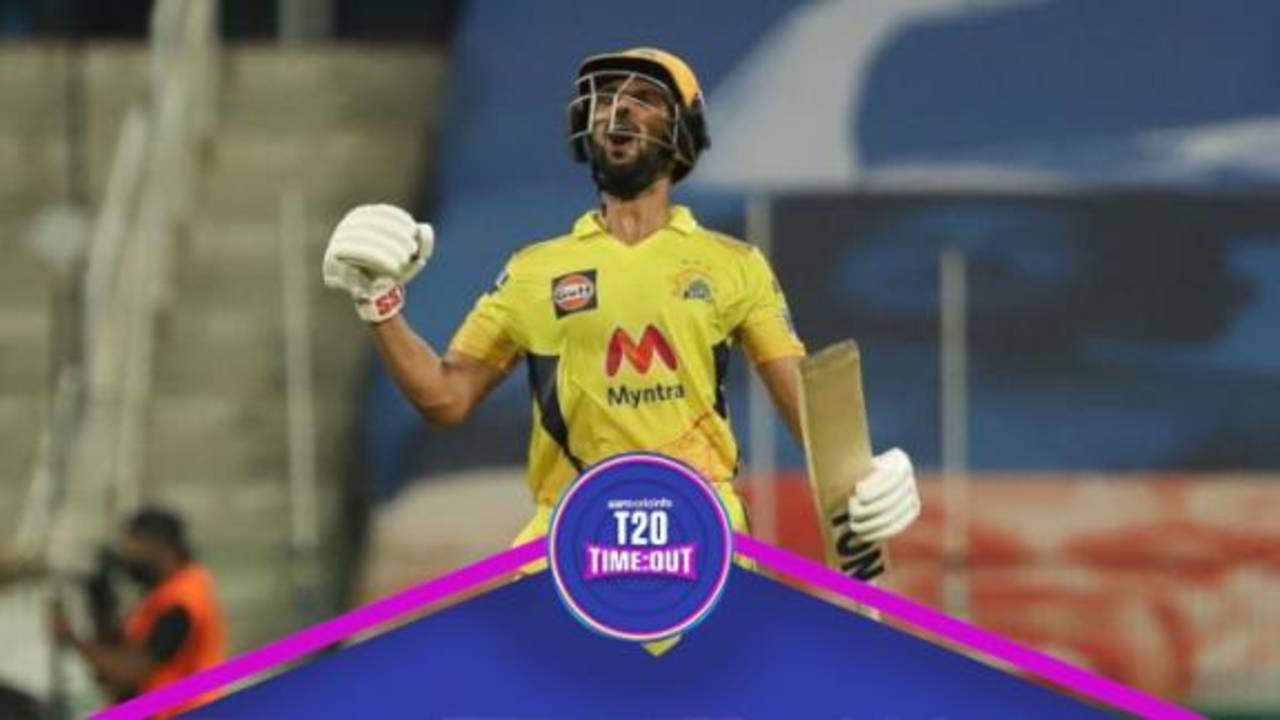When a side wins so comfortably after conceding a century to an opposition batter, the first thing you tend to do is look at that hundred with suspicion.
Ruturaj Gaikwad's came up in 60 balls, off the last ball of the innings. While batting first in the IPL, there have been 11 innings lasting 60 balls or longer and worth between 100 and 105. Eight of them, including Gaikwad's, have come in defeats.
Gaikwad's innings, though, was not the problem
on the night. It was a night on which the first 10 overs of the match produced just 63 runs, and the next 27.3 went for 316 at 11.5 an over. Gaikwad's first 50 took 43 balls, the next 51 came in 17. All of a sudden you weren't thinking of the field settings each time someone hit the ball in the air. This was a pitch different to what has been on display so far this season: everything was travelling with the ball beginning to skid onto the bat.
It was one of those unfortunate things that can happen in T20: you get put in on a slightly sticky pitch, the dew then settles in in about 10 overs, and the ball starts to come on nicely. In a contest as short as a T20 match, even a period of five overs before the pitch settles down can prove critical.
MS Dhoni, Sanju Samson, Gaikwad and
Stephen Fleming all said that was the case. When you are put in on such a pitch, the best way to be competitive is to post an above-par score, which, according to Dhoni, would have been close to 250 here.
"My observations were that as the dew settled, the pitch just got better and better," the Super Kings' coach Fleming said. "The second half of our innings showed that as well. Initially there was a bit of stickiness so the ball just sat a little bit. Once the dew settled, it became an absolute road. Which is quite different to any other pitches we have played on so far. All games have been sort of 130-150."
The Super Kings have already qualified for the playoffs and look favourites to end up in the top two, which means the ideal response from them would be to forget such a match and move on. However, this is something that can happen in a knockout game too.
If an identical match were to happen in identical conditions, Dhoni doesn't believe it would be possible to set a target of more than 190 or 200. Dhoni said his openers have been really good at assessing the conditions, and while the idea is to prevent over-attacking and losing too many wickets early, this wasn't a case of a hangover from earlier slow pitches and thus aiming too low.
What a side can change when they lose such a bad toss is either take that over-attacking route, which is a risk, or, as Dhoni would want, be smarter with the ball. In their ideal XI, Super Kings would have Dwayne Bravo and Deepak Chahar, who were rested against the Royals and should make a difference when they return, but Dhoni and Fleming would like to see better thinking from the bowlers when caught in another onslaught.
"The wicket changed quite a bit," Dhoni said when asked how much he missed Chahar and Bravo. "Both of them are quite experienced, but I felt their batters put us under pressure. What we could have done slightly better was maybe use the dimensions of the field. Or put fielders where you would like to bowl, make them go over the [boundary] fielders rather than go over mid-off or short cover."
Fleming echoed the sentiment. "It is not a bad thing to have a high-scoring game like this and be tested," Fleming said. "It gives you some really good coaching points and improvement points. One of them is how to absorb an onslaught like that. It was spectacular and it was great play. The only criticism would probably be our adjustments were not as quick as they needed to be."

